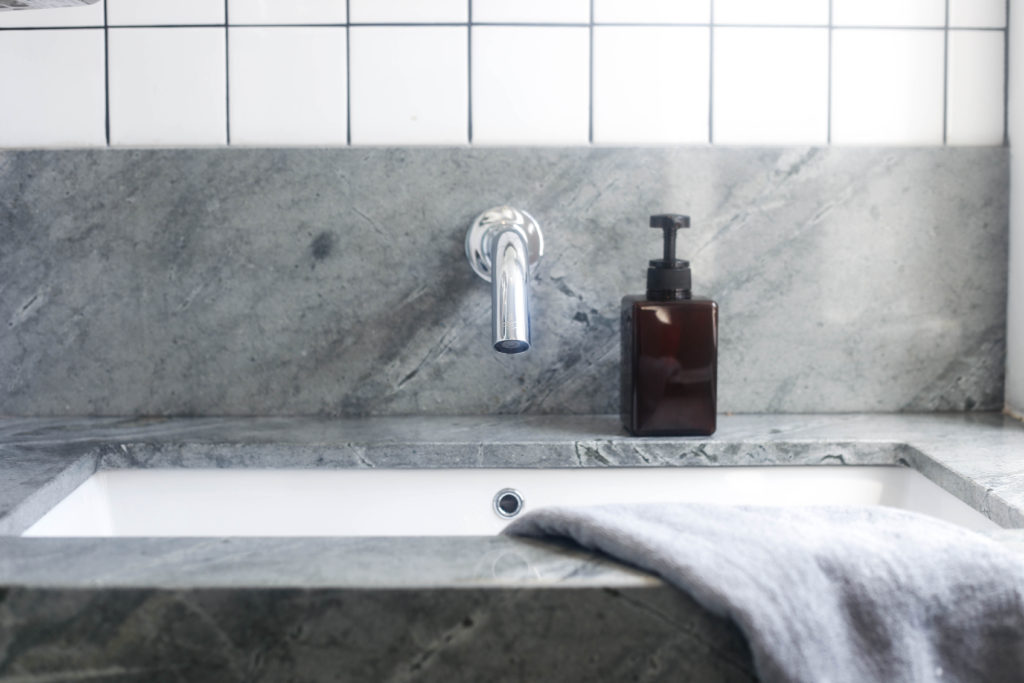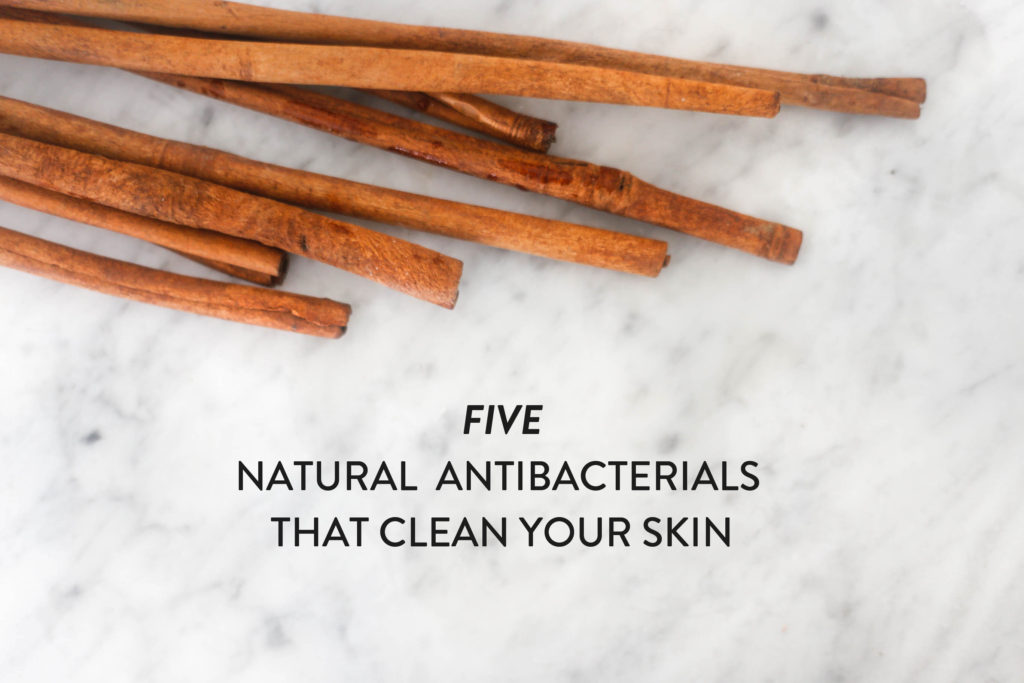[yellowbox]
Hi, if you’re here because of the coronavirus pandemic, you’re in the right place! I’m Militza, and I’ve been teaching safe and natural homemade alternatives to conventional skincare for almost 10 years.
The advice below is up-to-date, but when you’re done reading, you’ll find more information and resources on my Instagram account, @littlegreendot.
Stay home, and stay safe! ?
[/yellowbox]

Wow, this is big!
The U.S. Food & Drug Administration recently put down a final ruling to ban the sale of many antibacterial soaps, after concluding that the risks outweighs the benefits.
In this article, I’m going to tell you a little more about the ban and what it means, and share five natural antibacterial options that are much better than than the nasties out there.
What’s the dirt on antibacterials?
Adding antibacterial ingredients to soap became a multi-billion dollar business. Consumers felt safer with the added protection it promises…
But when put to the test – manufacturers failed to demonstrate to the FDA that antibacterial ingredients are both safe for long-term daily use and more effective than plain soap and water.
[irp posts=”215″ name=”{diy} Anti-Bacterial Hand Scrub Recipe”]
Here’s what the FDA says about antibacterials
“Consumers may think antibacterial washes are more effective at preventing the spread of germs, but we have no scientific evidence that they are any better than plain soap and water,” said Dr. Janet Woodcock, director of the FDA’s Center for Drug Evaluation and Research, in a written announcement.
“In fact, some data suggests that antibacterial ingredients may do more harm than good over the long-term.”
What does the FDA ban mean?
Within one year, manufacturers will no longer be allowed to market soaps and washes that contain antibacterial ingredients like Triclosan, and 18 other chemicals that are not safe, and not effective.
Health experts have been actively pushing the FDA to ban Triclosan since 1978 – with growing concerns of interfering with children’s hormones and promoting antibacterial-resistant bacteria.
Finally, after nearly 40 years and a recent lawsuit – the FDA took some action.
“It has boggled my mind why we were clinging to these compounds” said Rolf Halden, a scientist at the Biodesign Institute at Arizona State University, who has been tracking the issue for years. “They had absolutely no benefit but we kept them buzzing around us everywhere.”
Mae Wu, a senior attorney involved in the lawsuit that won this ban said “We call it stupid uses of toxic chemicals.” adding “There’s no reason to do it, and you could be hurting yourself and your family in the process.”
Woot, go get ’em, Mae!
Five Natural Antibacterials That Clean Your Skin
The FDA ban is a good first step. But, Mae Wu points out that these chemicals can still show up in your products.
The good news is that at home, you have access to natural ingredients that can keep you skin healthy and clean.
There is so much available to you and I love showing you new ways to simplify… so here are five natural antibacterials that clean your skin.

Natural Soap
The saponins found in natural soap are effective at killing bacteria and disease-causing germs. For hand washing, the old rule is: lather up and rub your hands for at least 20 seconds (on average people only wash for 6 seconds!)
Tip: while you’re washing your hands: Sing row-row-row your boat three times – and then you’re done!
Honey
Was used by ancient Romans to treat battle wounds and infections. It helps your body fight infection and prevent the growth of bacteria. You can also use honey directly on your skin as a cleanser. It’s very good if you have pimples or breakouts.
Cinnamon and Clove
In the spice world, both cinnamon and clove rank highest in terms of antibacterial properties. You’ll find that many hot climate countries tend to use these spices in their food. They inhibit the growth of bacteria.
My Body Glow Oil from the SIMPLIFY Skin Autumn collection infuses both cinnamon and cloves – use it right after a shower.
Apple Cider Vinegar
Vinegar has been used in household cleaners, for it’s antibacterial properties. When properly diluted, a little apple cider toner can help to cleanse your skin and prevent breakouts.
Bonus: Scrubbing
It’s not all about killing bacteria, friction removes bacteria and cleans your skin. Make yourself a body scrub and use it once a week in place of soap. Coconut oil is a good choice for your scrub, it’s naturally antibacterial and wonder skin cleanser.
If you’re scrubbing your face, make sure you use very gentle, fine grains and don’t apply too much pressure. Your body loves a good scrub – go in circular motion moving from your limbs up towards your heart. It’s going to help stimulate your body to improve circulation and detox from the inside too!

10 responses to “It’s official – antibacterial soaps have been kicked to the curb!”
I can attest to the use of Honey. I now no longer buy pimple cream, instead I use a small tinge of manuka honey on my spots and they shrink and heal very quickly with minimal scarring 🙂
Hi Gem! Isn’t the best?! I love using it all over my face, it feels very soft and clean after!
I am looking for an alternative to liquid antibacterial hand soap for hand washing, it has to be strongly antibacterial but without the chemicals. If I add clove oil to liquid soap would that work I wonder?
I’m looking for an alternative to liquid anti bacterial body wash. Due to diabetes the warm weather forms bacteria.. Anti bacterial body wash alternative would be considered or naturals will be even better..
Would you recommend Castille soap? I am looking for a very effective natural antibacterial hand soap, thanks in advance.
Try this Castile
[…] I was already a nerd about toxins back then, and I knew that the common ingredients used to turn hand soap “antibacterial” were reputed to mess with hormones (always a red flag), promote antibiotic-resistant bacteria, increase risk of allergies in children, pollute the environment and drinking water, and harm pregnant women and their unborn babies. Most ridiculous of all: antibacterial soap was never proven to prevent germs or disease better! Experts in certain corners have been pushing against these chemicals since 1978. […]
Antibacterial soaps for household use generally contain the active ingredient triclosan at concentrations between 0.1% and 0.45% weight/volume. Triclosan has varying effectiveness across bacterial and fungal species and is less effective against viruses. A related compound, triclocarban, is used in antibacterial bar soaps. Mygenericpharmacy providing best anti bacteria solution.
Antibacterial soaps for household use generally contain the active ingredient triclosan at concentrations between 0.1% and 0.45% weight/volume. Triclosan has varying effectiveness across bacterial and fungal species and is less effective against viruses. A related compound, triclocarban, is used in antibacterial bar soaps.
About over 1500 years ago Christ’s thorn jujube leaves were crushed to powder then mixed with water to clean the whole body including hair besides the use of Henna. Read about the leaves.. nothing can ever be more organic or natural than that. Filled with cleansing and healing propeties plus, wards off lice.
I cannot seem to understand how come nobody ever mentioned it!
I used it myself for years.